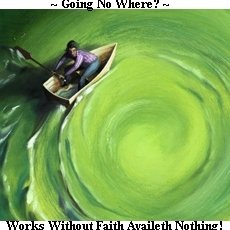Imputed Righteousness
by Don R. Hender
F A I T H W O R K S !
One cannot win a race without running.
One does not win a race by just sitting on the sideline.
One does not win a race by going in reverse, backwards.
Sure and steady wins the race by traveling the course.
To win God's race you must cross the finish line.
There is a Christian Doctrine which is most misunderstood called 'Imputed Righteousness' in reference to Paul's teachings found in Romans 4:6. Often Paul is called upon in his preaching to deal with the concepts held by the Jews, who believed that man could save himself just by compliance to the laws of God, such as the 613 rules of traditional commandments of the Jews. But Paul understood that no matter what man did in compliance and obedience, man alone could never raise himself to the level of the righteousness of God. Thus Paul would often teach that works alone cannot bring man to God. But Paul did not mean to imply that the doing of 'good works' were not to be overlooked or undone. In Pauls own words, 'God forbid!' In fact Paul would find himself very much on the same page with James in that consideration, that 'Faith without works is dead!'
Thus on the one hand no matter what you do, you alone cannot bring yourself to God in Heaven. Yet on the other hand, you cannot just stand idlely by doing nothing, particularly doing nothing but evil. If you doing nothing at all you have shown by the lack of your good works that you do not truely believe in God and Christ. You must commit and strive to follow in the paths of righteousness or else your faith in Chirst is proven to be but 'dead' and useless. This relationship between faith, works and the imputing of righteousness upon man through Christ is well put in a Book of Mormon quote.
"For we labor diligently to write, to persuade our children, and also our brethren, to believe in Christ, and to be reconciled to God; for we know that it is by grace that we are saved, after all we can do." ~ 2 Nephi 25:23
Though try as a man will he cannot lift himself up by his boot straps. That is we must fully understand our dependance upon Christ and God, that it is only by his grace and mercy and the atonment process of imputing his righteousness upon us as the fallen creatures of this earth that we are saved. But this does not absolve us from living righteously and keeping the commandments of God which he has give us to do. We cannot live wickedly and riotously purposefully and expect God to save us in and despite of our sins. We must stive to live the way of righteousness, the strait and narrow way which Christ has shown us and asked us to follow him in. And after we do all that which we are able to do, then the mercy and grace of God takes hold and further imputes his higher and greater degree of righteousness unto us that we might stand spotless before God the Father and accepted by Him into Eternal Life.
Christ loves us and understands us and our weakness of being but mortal corruptible men before him. And he will judge us justly accordingly. He does expect us to honor him and stive to all that we can do to live by his course of righteousness and perfect peace with him. And then by the power of the atonement he does raise us up to be even as he is, imputing his righteousness unto us. We cannot not earn it in and of ourselves alone. We cannot not live as perfect and as high as God is. We will always have the weakness of the flesh which Paul did accurse that he had to live in and could not be perfect in and of himself as he had learned as a 'stict Jew'. Paul had to in his weakness humble himself before Christ, by whose mercy it is sufficent to raise us up to the level of the righteousness of God.
So thus Paul taught vigorously against the 'pride of the Jews' who thought and taught that one can and does save themselves by strict obedience to God alone. No man can for no man is without sin and no man is so perfect in righteousness before God alone by himself. Man must rely upon the grace and mercy of God, Christ and his atonement to satisfy the demands of justice for my himself man is not justified before God no matter what he does. Paul taught that without the application of the Salvation which Jesus Christ provided, no man could return to the presence of God and God's Kingdom. Only through and in Jesus Christ could man rise to the level of God by that means provided by the atonement and by Christ imputing his righteousness upon man.
And that way and that course is set, it is the course and way of Jerusalem, or Jehovah's Course of Perfect Peace with God. One must have faith, active faith, faith that will take action in the Lord Jesus Christ, one must turn from the ways of the corrupted man to the ways of God by repentance, one must bathe in the newness of life by the new birth of baptism by water and by fire, which is the Holy Ghost. And the is to walk in the ways of God as so revealed unto him in that hope of obtaining eternal life through Jesus Christ and his merits. And finally man must come to live in the love of God which is also in the love of his fellow man, without which man is nothing before God. Then, if man so endures to the end, it is by the grace, mercy, merit and the imputing of Christ righteousness upon him that man is saved.
 "Even if you are the last duck in the row, you must still do something to get
where you are going."
"Even if you are the last duck in the row, you must still do something to get
where you are going."Now one does often hear the message of the Apostle James that 'Faith without works is dead.' That was his true message and the Apostle Paul would agree with it in such words as, 'God forbid that the doing of good and proper works be seen as not a part and partcile of the Gospel of Jesus Christ.' But one must understand Paul's audience to whom he mostly spoke were the Jews who believed that a man could save himself by his works only. To that end Paul's tag line could will be, 'Works alone availeth nothing.' For without faith in and reliance upon the Lord Jesus Christ and the workings of his atonement, we would be forever lost, unable to ever return to the presence of God.


revised March 14, 2013